What Became of Atlantis:
The Flood from Heaven
by Brad
Yoon
Skeptics and believers alike tend to overlook the fact that the story of Atlantis, as told by the Egyptian priests who related the story to Solon, is a complex narrative involving three civilizations that supposedly existed contemporaneously with each other; namely, Athens, Egypt, and Atlantis itself.
According to Sonchis, the head priest of Sais, the distant ancestors of the Athenians had led a coalition that counted amongst its members’ other Hellenic city-states and an ancient Egypt to a spectacular victory over the armies of Atlantis—which had aggressed upon them and attempted to reduce all who dwelt along the shores of the Mediterranean to slavery.
Earthquakes and Floods

A recreation of a devastating flood. (Flickr/CC BY 2.0)
“And when … the Gods purge the earth with a flood of waters, all the herdsmen and shepherds that are in the mountains are saved, but those in the cities of your land are swept into the sea by the streams; whereas in our country neither then nor at any other time does the water pour down over our fields from above, on the contrary it all tends naturally to well up from below (emphasis mine)” (Timaeus, 22e).

‘The Deluge’ by Francis Danby, 1840. (Public
Domain)
Historical Disasters: What Happened?
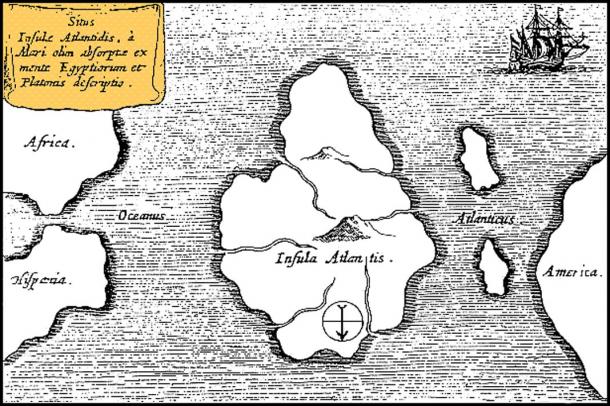
Plato's Atlantis described in Timaeus and
Critias. (Public
Domain)
Any dry lands that are below sea level with a sea or ocean nearby are at a constant risk of catastrophic flooding, especially in a region that is prone to earthquakes and landslides, for if any portion of the higher lands that surround the below sea level region collapse below sea level, the surrounding sea, impelled by the force of gravity, will pour into the low lying lands. Moreover, the magnitude of such floods would certainly suffice to account for the near total destruction of the primeval Greeks and their loss of culture; these floods, by their very nature, would have come without warning and with tremendous rapidity. Thus far, we have only discussed Athens and Egypt, but what of Atlantis?
In a later passage, Plato recounts the destruction of the Athenians and the Atlanteans:
“But at a later time there occurred portentous earthquakes and floods, and one grievous day and night befell them, when the whole body of your warriors [the Athenians] was swallowed up by the earth, and the island of Atlantis in like manner was swallowed up by the sea and vanished...” (Tim., 25c-d).
Could the common fate of the Atlanteans and the Athenians be accounted for by a commonality in the geography of their respective lands? That is, could parts of Atlantis have been below sea just as I hypothesized the homeland of the primeval Athenians to have been?
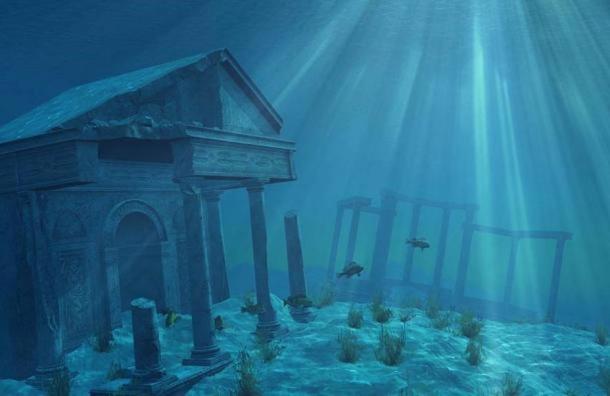
Artist’s representation of Atlantis. Source:
BigStockPhoto
“In the first place, then, according to the account, the whole region rose sheer out of the sea to a great height, but the part about the city [the royal city of Atlantis] was all a smooth plain, enclosing it round about, and being itself encircled by mountains which stretched as far as to the sea; and this plain had a level surface and was as a whole rectangular in shape, being 3000 stades long [340 miles, 547 km] on either side and 2000 stades wide [230 miles, 370 km] at its center, reckoning upwards from the sea. And this region, all along the island, faced towards the South and was sheltered from the Northern blasts. And the mountains which surrounded it were at that time celebrated as surpassing all that now exist in number, magnitude and beauty...” (Critias, 118a-b).
In other words, the royal city of Atlantis was situated on a large, nearly rectangular plain with dimensions 340 miles by 230 miles, which was in turn surrounded by mountains that rose high above the sea. Although Plato never uses the word "basin" to describe the geography of Atlantis, the rectangular plain and the mountains surrounding it together form what is essentially a textbook definition of a basin –a lower-lying land surrounded by higher lands. Could the city of Atlantis, and the plain on which it was situated, have been below sea level not only after their destruction in which Atlantis was "swallowed up by the sea and vanished" but also before? If it were, the mountains surrounding the plain must have been above sea level all around the plain so as to keep the surrounding waters from pouring into it. What is the advantage of this hypothesis?
What Did Not
Happen?
“Put simply, continents do not rise and fall into the oceans; they are composed of tectonic plates moving across the earth very slowly and in different directions. As they move and run into each other, they cause earthquakes and the formation of mountain ranges. One plate may push underneath another, slowly to be absorbed back into the mantle (as is happening, famously, in Los Angeles), or adjacent plates may be traveling in opposite directions, causing earthquakes. In either of these scenarios, the continent itself does not disappear beneath the ocean; either the collision produces new mountain ranges (The Himalayas, for instance) or one plate is slowly drawn under the other. Plato’s – and Hancock’s – idea of a rapid sinking is not part of plate tectonics.”
But supposing that the plain of Atlantis was already below sea level even before it was deluged (and the surrounding mountains above sea level all around) circumvents the necessity of the entire landmass of Atlantis having sunk in order for the city and the plain to be swallowed up by the sea, as only a single point along the encircling mountain range need have sank below sea level for the surrounding sea to begin to pour into the plain below! Therefore, Fitzpatrick-Matthews' argument above is entirely bypassed, as well as the similarly constructed arguments put forth by other scholars disputing the consistency of Plato's account.
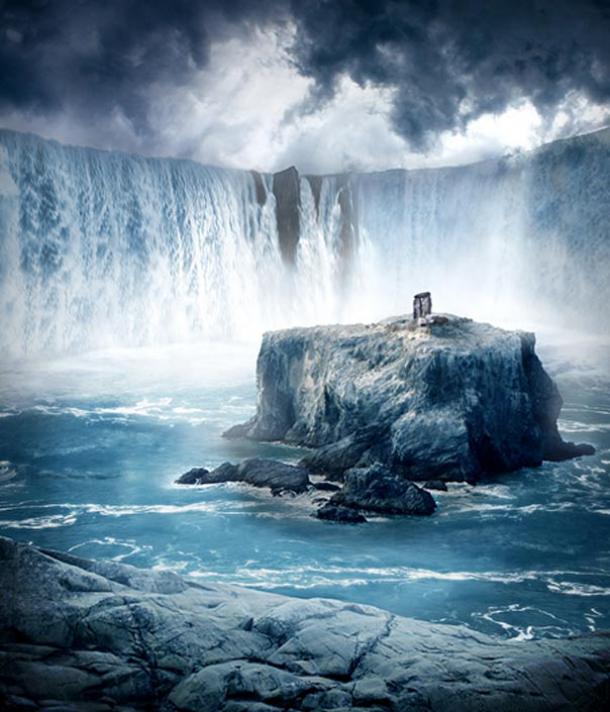
Water pours down over a rocky ledge and into
valley basin below. (Flickr/CC BY-ND 2.0)
But if the same earthquake had occurred somewhere along the hypothetical mountain range that surrounded the plain of Atlantis (assuming that it was below sea level), and a small area of land had collapsed or sunk likewise below the level of the sea would have, in turn, triggered an infinitely greater disaster, as the waters of the surrounding ocean would have begun to pour into the plain; further, it is entirely reasonable that such a flood could have taken only a single day and a night.
If, on the other hand, the plain of Atlantis was above sea level before its destruction, as has been implicitly assumed by most scholars, this 80,000 square mile plain and its surrounding mountains would have had to sink in a single day and a night for it to have been submerged.
While such a scenario is not entirely impossible, there really is no known geological mechanism that could conceivably cause such a large landmass to sink so rapidly, just as Fitzpatrick-Matthews pointed out. Therefore, one may reasonably ascertain that if Atlantis did indeed, its plain was very likely to have been below sea level and its surrounding mountains above sea level all around—that is, Atlantis was very likely an endorheic basin: a closed drainage basin that retains water and allows no outflow to other external bodies of water.
The Location of Atlantis
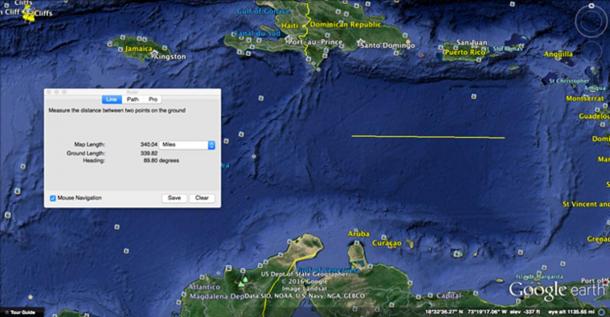
(Source: Google Earth, 2016)
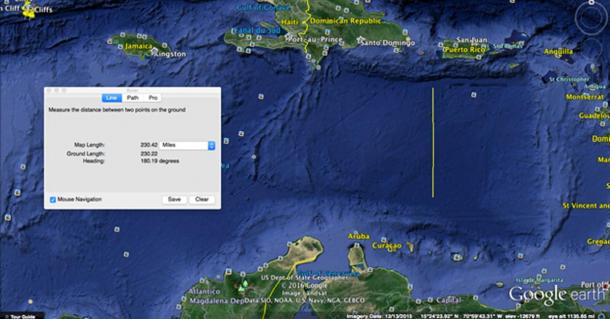
(Source: Google Earth, 2016)
References
Plato. Plato in Twelve Volumes, Vol. 9 translated by W.R.M. Lamb. Cambridge, MA, Harvard University Press; London, William Heinemann Ltd. 1925.
From Ancient Origins @ http://www.ancient-origins.net/opinion-guest-authors/what-became-atlantis-flood-heaven-005536?nopaging=1
N.I. Comments: Due to the equarorial bulge which girdles the Earth, an equatorial continent can sink miles below its original level in a single day or night if the planet tilts, displacing it from the bulge - which is a raised region between the tropics approximately 30 degrees wide. It's evident that the globe DID tilt by at least 20 degrees at the end of the last glaciation - around Plato's date for the sinking of Atlantis - as evinced by the distribution of ice sheets before and after the event...

The Clovis comet hypothesis, is one of the competing scientific explanations for the onset of the Younger Dryas cold period after the last glacial period.
The hypothesis, which scientists continue to debate, proposes that the climate of that time was cooled by the impact or air burst of one or more comets.
Though, the Clovis Comet hypothesis is highly controversia, the general hypothesis states that about 12,800 years ago, air burst(s) or impact(s) from a near-Earth object(s) set areas of the North American continent on fire, disrupted climate and caused the Quaternary extinction event in North America.
This resulted in the extinction of most of the megafauna, and the rapid demise of the North American Clovis culture.
The evidence in favour of a meteoric impact initiating the Younger Dryas cooling period includes carbon-rich layers of soil have been found at some 50 Clovis sites across North America.
Several layers containing anomalous materials were discovered at the very bottom of the 'black mats' of organic material that mark the beginning of the Younger Dryas.
It has been claimed that these anomalous materials cannot be explained by volcanic, anthropogenic, or other natural processes, and were therefore evidence of an impact event.
Here is the investigation with Carlos Rubia.
Was Atlantis destroyed by impact of the Clovis Comet
12,800 years ago?

12,800 years ago a
meteorite named the Clovis comet crashed into our planet and it could have
produced a mass extinction. Maybe that is why Atlantis
or Lemuria disappeared?
The Clovis comet hypothesis, is one of the competing scientific explanations for the onset of the Younger Dryas cold period after the last glacial period.
The hypothesis, which scientists continue to debate, proposes that the climate of that time was cooled by the impact or air burst of one or more comets.
Though, the Clovis Comet hypothesis is highly controversia, the general hypothesis states that about 12,800 years ago, air burst(s) or impact(s) from a near-Earth object(s) set areas of the North American continent on fire, disrupted climate and caused the Quaternary extinction event in North America.
This resulted in the extinction of most of the megafauna, and the rapid demise of the North American Clovis culture.
The evidence in favour of a meteoric impact initiating the Younger Dryas cooling period includes carbon-rich layers of soil have been found at some 50 Clovis sites across North America.
Several layers containing anomalous materials were discovered at the very bottom of the 'black mats' of organic material that mark the beginning of the Younger Dryas.
It has been claimed that these anomalous materials cannot be explained by volcanic, anthropogenic, or other natural processes, and were therefore evidence of an impact event.
Here is the investigation with Carlos Rubia.
From UFO Hotspot @ http://ufosightingshotspot.blogspot.com.au/2016/03/was-atlantis-destroyed-by-impact-of.html
For more information about Atlantis see http://nexusilluminati.blogspot.com/search/label/atlantis
- Scroll down
through ‘Older Posts’ at the end of each section
Hope you like this not
for profit site -
It takes hours of work every day by
a genuinely incapacitated invalid to maintain, write, edit, research,
illustrate and publish this website from a tiny cabin in a remote forest
Like what you see? Please give anything
you can -
Contribute any amount and receive at
least one New Illuminati eBook!
(You can use a card
securely if you don’t use Paypal)
Please click below -
Spare Bitcoin
change?
For further enlightening
information enter a word or phrase into the random synchronistic search box @
the top left of http://nexusilluminati.blogspot.com
And see
New Illuminati – http://nexusilluminati.blogspot.com
New Illuminati on Facebook - https://www.facebook.com/the.new.illuminati
New Illuminati Youtube Channel - https://www.youtube.com/user/newilluminati/playlists
New Illuminati’s OWN Youtube Videos
-
New Illuminati on Google+ @ For
New Illuminati posts - https://plus.google.com/u/0/+RamAyana0/posts
New Illuminati on Twitter @ www.twitter.com/new_illuminati
New Illuminations –Art(icles) by
R. Ayana @ http://newilluminations.blogspot.com
The Her(m)etic Hermit - http://hermetic.blog.com
DISGRUNTLED SITE ADMINS PLEASE NOTE –
We provide
a live link to your original material on your site (and links via social
networking services) - which raises your ranking on search engines and helps
spread your info further!
This site
is published under Creative Commons (Attribution) CopyRIGHT (unless an
individual article or other item is declared otherwise by the copyright
holder). Reproduction for non-profit use is permitted & encouraged - if you
give attribution to the work & author and include all links in the original
(along with this or a similar notice).
Feel free
to make non-commercial hard (printed) or software copies or mirror sites - you
never know how long something will stay glued to the web – but remember
attribution!
If you
like what you see, please send a donation (no amount is too small or too large)
or leave a comment – and thanks for reading this far…
Live long
and prosper! Together we can create the best of all possible worlds…
From the New Illuminati – http://nexusilluminati.blogspot.com

No comments:
Post a Comment
Add your perspective to the conscious collective